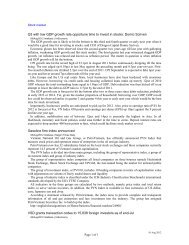31 Aug 2012 Intellasia Finance Vietnam - Hong Kong Business ...
31 Aug 2012 Intellasia Finance Vietnam - Hong Kong Business ...
31 Aug 2012 Intellasia Finance Vietnam - Hong Kong Business ...
You also want an ePaper? Increase the reach of your titles
YUMPU automatically turns print PDFs into web optimized ePapers that Google loves.
FINANCE<br />
<strong>Vietnam</strong> finance & business <strong>31</strong> <strong>Aug</strong>ust <strong>2012</strong><br />
holds no surprise that real estate loans (together with bad debt in securities industry)<br />
account for the largest proportions in total bad debts of credit institutions in <strong>Vietnam</strong>.<br />
Avoiding groundless optimism<br />
Investments in real estate development and cement production projects and other<br />
non-core businesses have caused giant State-owned enterprises (SOEs) and popular<br />
private firms to hold above half of bad debts in the banking system. Credit institutions<br />
stopped funding the real estate market. The burst of real estate bubble has panicked<br />
investors although none wants to mention it.<br />
Bad real estate debts include debts of investors to construction contractors; debts of investors<br />
to credit institutions; and land-related loans of investors (land rents, site clearance<br />
compensations, etc).<br />
Another source of debts comes from deposits and advances from homebuyers. However,<br />
investors do not have houses to hand to buyers.<br />
Bad property debts come from both subjective and objective reasons. Objectively, economic<br />
slowdown and other risks drag on property demand. And, subjective causes decide<br />
the severity of bad debts. In particular, risk management capabilities, especially<br />
monetary risk management of both lenders and borrowers play very important roles.<br />
In fact, many real estate companies (and not only they) know little about business risk<br />
management, even have very poor knowledge of market and investment project establishment,<br />
and disregard target market research. What they care is eventual ideal results:<br />
Multiple profits on investment.<br />
Another reason is groundless optimistic forecast by specialists and authorities, aiming<br />
to sooth the public. This lingers property investors to use timely solutions to deal with<br />
bad debts.<br />
Only enterprises that are alive can repay debts<br />
Credit institutions deal with bad property debts in two ways: (1) immediately cash recovery;<br />
and (2) future cash recovery.<br />
The first method has six ways to deal with security assets: Compulsory sale, package<br />
sale, general sale, inclusion of all debts, leasing and legal actions.<br />
The future cash recovery is expected to have two ways to handle debts: Convert debts<br />
into shares; and convert bad debts into securities.<br />
I think that our country can apply these methods now except securitisation because<br />
our stock market is too young.<br />
However, these methods are deployed at the last resort. As only living businesses can<br />
repay debts, lenders should sit down with indebted companies to discuss solutions.<br />
If they have good incomplete projects like building affordable houses or offices for<br />
lease, banks should fund them to complete those projects.<br />
If borrowers find buyers for their ongoing projects and change purposes of those<br />
projects like hospitals or schools, banks (and authorities) should facilitate them to finalise<br />
the deals if they do not cause any problems to master planning.<br />
Debt freezing, debt rescheduling and rate cut should also be taken into consideration<br />
if borrowers can thereby increase the capacity of repayment.<br />
They can sell projects to other investors or cancel suspended projects.<br />
Some bankers used to say that they would rather let capital be idle rather than lend real<br />
estate companies. In reality, not all the property market of <strong>Vietnam</strong> is frozen. Some<br />
projects are stilling making a profit in this tough time. So, why did they discontinue<br />
financing? Real estate businesses are important customers of banks and they are not<br />
deserved to be dropped. Banks should have had risk management plans for your businesses,<br />
not behaved like that.<br />
Apart from reducing prices, changing usage purposes to sellable segments and cutting<br />
expenses to deal with bad debts, real estate businesses also need to seek out other creative<br />
solutions like accepting instalment payments. These will ease pressures for customers,<br />
banks and themselves.<br />
Finally, real estate enterprises must undergo restructuring.<br />
A majority of real estate companies have small operating scale, with registered capital<br />
of less than VND10 billion (less than VND500,000), they are not strong enough to deal<br />
<strong>Intellasia</strong> <strong>31</strong> <strong>Aug</strong>ust <strong>2012</strong> 5 / 46









